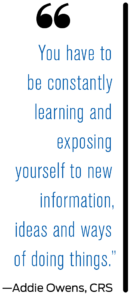For real estate team leaders, ensuring the success of the agents under your employ is an added responsibility
By Scott Mason
Real estate brokers have a multitude of responsibilities on a day-to-day basis.
Not only are they out in the field helping buyers and sellers with transactions, but they are also designated team leaders, steering other agents toward success.
Addie Owens, CRS, CEO of Touchstone Real Estate in Mount Dora, Florida, has been a team leader since 2016 and at one point had 45 agents in her employ—an experience she rates as “zero stars.” She explains that having too large of a sales team can lead to a lack of productivity, affecting the entire team’s success. “The ratio for highly productive agents, it’s usually about 10%–15%,” she says. “And the remaining 85%–90%, just bog you down.”
Owens’ experience with team bloat is just one of the many potential explanations for why your team may not be as successful as you wish. What’s holding your team back from success? And how can you, as a team leader, help correct the issues?

Developing and honing skills
To realize true success, agents must adapt to the current market. This is especially true when it comes to the specific skills that make agents great at what they do. John MacGilvary, CRS, chief growth officer at Berkshire Hathaway HomeServices Verani Realty in Londonderry, New Hampshire, says that lack of success can be the result of passivity and not being proactive. “Some agents rely on their sphere or circle of relationships to tell them when they are ready to buy or sell,” he says. “They’ll say, ‘Hey, give me a call when you’re ready,’ but that really isn’t sufficient.”
MacGilvary recommends that brokers encourage their agents to leverage their expertise and be more influential to get results. “You have to work with agents to help them develop their prospecting skills and how to handle the current objections,” he says. “You also really need to improve an agent’s pre-listing and listing skills. They need to learn how to leverage each opportunity and multiply the potential that each listing could bring them in terms of additional business.”
Owens says continuing education is another necessity to ensure your team’s success. “You have to be constantly learning and exposing yourself to new information, ideas and ways of doing things,” she says.
While learning new things is great, she also warns agents to remain disciplined in their current behaviors at the same time. “REALTORS® tend to chase the next shiny object,” she jokes. “We don’t necessarily need to do that, as some of the most fundamental of skills in real estate still work today without having to adopt the newest or fanciest tool or strategy.”
Self-reflection is necessary
While many brokers may want to lay the blame for a team’s lack of productivity at the feet of the agents, sometimes the issues may be traced back to the team leaders.
Joy Carter, CRS, team leader at Great Florida Homes at Keller Williams in Coral Springs, Florida, says she takes full responsibility for her team not performing at 100%. “I have good people on my team, but I’m not being the ringmaster. I’m supposed to be the ringmaster, but I’m not doing my job,” she says.
While her team is still very successful, she says, her business is not growing at the rate and performing at the level it should be—and that’s on her. She attributes this to her taking on a city commissioner role with the local Coral Springs government, which takes up close to 60 hours of her time each month. But, a bit of self-reflection and awareness has allowed her to realize the error in her ways, and she has begun correcting these mistakes.
“Two years ago, when I realized that I had two years left for the [city commissioner] job, I thought, ‘Well, when I’m done being a commissioner, I’ll start driving everybody and will go back to be that team leader, making everybody accountable,” she says. “But then I had the realization, ‘Why wait two years when you can start now?’”
Strategies for success
If you’re noticing your team is lagging behind, there are practical ways to help correct the issues and guide team members toward a better path.
MacGilvary has taken accountability to a new level with his team, meeting weekly to determine if goals have been met or if anyone is struggling. “We ask our agents every week, ‘What did you hope to accomplish last week? What do you hope to accomplish this coming week?’ It keeps people really focused,” he says. “Holding each other accountable even when times get tough is very important. The intent is to encourage people not to give up. Some people will have bad days, and some will have great days—but having a positive attitude and energy lifts the entire team.”
Owens advises team leaders to take a step back from the day-to-day responsibilities to understand why their team may be struggling. “Every quarter, step back for 24 or 48 hours and look at two things: what’s going wrong and what’s going right,” she says. “You’ve got to get out of that daily grind to look up and really assess. I think we get so caught up in the daily busyness of everything that we’re not analyzing the problems and solutions.”
Regardless of the strategy you take to get your team back on track, it comes down to effective leadership and motivation, Carter says. “Unless an agent is incredibly self-motivated, if there’s not somebody back there driving them, they’re just going to get by. Someone must be pushing—the leader has to be encouraging to ensure they’re getting the most out of their team.”
What Are Your Working Geniuses?
Identifying your strengths and weaknesses is a great way to realize success as a real estate agent, and there are several ways an agent can do this for themselves and their team members. For Addie Owens, CRS, CEO of Touchstone Real Estate in Mount Dora, Florida, adopting the Working Genius model helped her and her team tremendously.
Authored by world-renowned C-suite consultant Patrick Lencioni, the Working Genius model identifies six core “natural gifts” that can be applied to the workplace:
Wonder: Pondering the possibility of greater potential and opportunity in a given situation
Invention: Creating original and novel ideas and solutions
Discernment: Intuitively and instinctively evaluating ideas and situations
Galvanization: Rallying, inspiring and organizing others to take action
Enablement: Providing encouragement and assistance for an idea or project
Tenacity: Pushing projects or tasks to completion to achieve results
“The model says that everyone has two geniuses, two competencies and two frustrations,” Owens says. “Everyone is working all six areas at once, but if you’re spending 60%–70% of your time performing tasks that are your frustrations, that’s when burnout and dissatisfaction happens.”
To be successful, Owens says you must work to the strengths you’ve identified for yourself. “Once people understand their strengths, that will fuel you,” she says. “If you don’t know what they are, you’ll always be playing catch up. You’ll always look for the next best thing or something to fix the problem.”
RRC offers live, virtual and recorded education opportunities covering team building, personality profiles and more. Visit CRS.com/catalogsearch to learn more.
Photo: iStock.com/Chris Ryan








